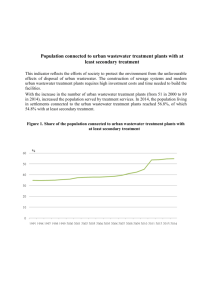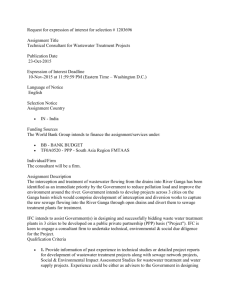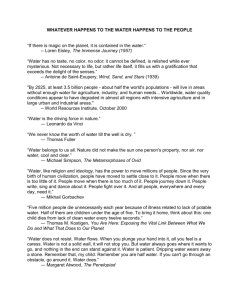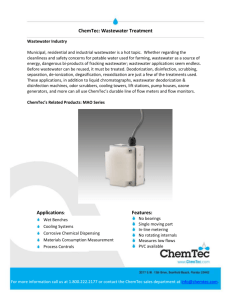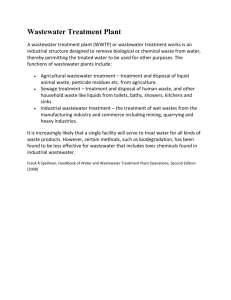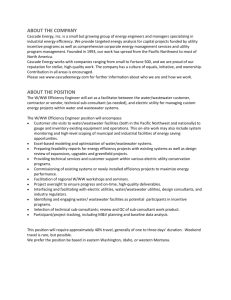ToR_for_Energy_Audit_of_Water_and_Wastewater_Utilities
advertisement
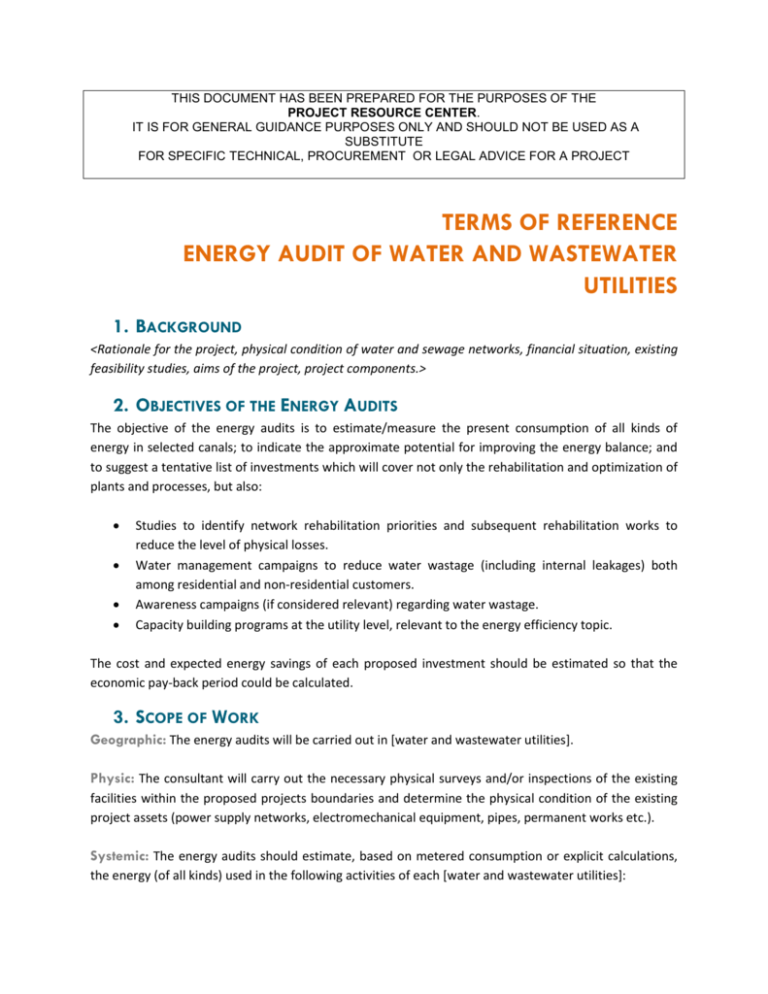
THIS DOCUMENT HAS BEEN PREPARED FOR THE PURPOSES OF THE PROJECT RESOURCE CENTER. IT IS FOR GENERAL GUIDANCE PURPOSES ONLY AND SHOULD NOT BE USED AS A SUBSTITUTE FOR SPECIFIC TECHNICAL, PROCUREMENT OR LEGAL ADVICE FOR A PROJECT TERMS OF REFERENCE ENERGY AUDIT OF WATER AND WASTEWATER UTILITIES 1. BACKGROUND <Rationale for the project, physical condition of water and sewage networks, financial situation, existing feasibility studies, aims of the project, project components.> 2. OBJECTIVES OF THE ENERGY AUDITS The objective of the energy audits is to estimate/measure the present consumption of all kinds of energy in selected canals; to indicate the approximate potential for improving the energy balance; and to suggest a tentative list of investments which will cover not only the rehabilitation and optimization of plants and processes, but also: Studies to identify network rehabilitation priorities and subsequent rehabilitation works to reduce the level of physical losses. Water management campaigns to reduce water wastage (including internal leakages) both among residential and non-residential customers. Awareness campaigns (if considered relevant) regarding water wastage. Capacity building programs at the utility level, relevant to the energy efficiency topic. The cost and expected energy savings of each proposed investment should be estimated so that the economic pay-back period could be calculated. 3. SCOPE OF WORK Geographic: The energy audits will be carried out in [water and wastewater utilities]. Physic: The consultant will carry out the necessary physical surveys and/or inspections of the existing facilities within the proposed projects boundaries and determine the physical condition of the existing project assets (power supply networks, electromechanical equipment, pipes, permanent works etc.). Systemic: The energy audits should estimate, based on metered consumption or explicit calculations, the energy (of all kinds) used in the following activities of each [water and wastewater utilities]: Water production; Water treatment for domestic consumption or industrial use; Water distribution, including pumping Wastewater collection; Wastewater pumping; Wastewater treatment; Auxiliary activities such as space heating, lightning, operation of vehicles etc. Temporal: Past and future energy use should be assessed, taking into account past or future efforts by the [water and wastewater utilities] to raise their EE, including obvious measures such as reducing water wastage through increased metering of consumption; operating the water supply system in better ways; capturing the heat in raw water or collected wastewaters through heat exchanges; generating biogas from treated sludge; optimizing processes (such as reducing the use of chemicals -such as lime- with a high energy content. The scope or work will include as well proposing measures and/or complementary studies to reduce water wastage through: Reduction of network leakages; Reduction of internal leakages within customers premises (in particular at apartment and administration buildings); awareness campaigns (if considered relevant) regarding water wastage. More generally the study will identify capacity building needs at the utility level, relative to any issue of significant importance for energy management. For example, if reduction of network leakages offers the greatest potential to lower energy consumption, and if the technical department of the utility lacks capacity to research leakages and repair them, then the study could provide recommendations towards the procurement of priority leaks research equipment, repairs tools and related training. Financial: The approximate cost of each sub-project should be calculated separately. Economic: The approximate cost of each proposed measure and investment should be estimated and the corresponding benefits in the form of reduced energy costs (with an estimate of likely future escalations of [country] energy prices), reduced maintenance costs (in case obsolete electromechanical equipment is replaced); reduced operations costs related to the optimization of processes and water demand management (including the reduction of physical losses); and the value of increased energy production (as in the case of heat energy captured from raw water and wastewater through heat exchanges, or through the production of biogas from treated sludge). An economic pay-back period should be calculated for the total package of each [water and wastewater utility], where the investment costs should be divided by the expected annual savings. The Consultant, out of the proposed investment plan, will extract and identify a priority investment plan, whose budget shall be limited to [budget]. The priority actions will be selected based on a costbenefit analysis ("benefit" relating to the level of energy consumption reduction). Institutional: It should be indicated if each [water and wastewater utility] is up to date in its payments for energy and if not, what the totality accounts payable to the power company is. Measures should also be suggested how the energy use could be monitored in the future so that utility benchmarks of energy efficiency could be established. Finally, measures to motivate staff (such as creating incentive programs for energy conservation) should be suggested. 4. IV. PROJECT MANAGEMENT The Consultant shall report to the Client and will be responsible for: Preparation of energy audit reports according to the terms of reference and to the highest professional standards; Providing accommodation, transport and freight expenditures of the Consultant's staff, as well as translation of all reports (drawings, specifications, etc.) into [languages]; Providing local office support services for report production and communication. 5. TIME SCHEDULE AND REPORTING REQUIREMENTS Project Start Date The project preparation activities are expected to commence in [date] and to be completed within 6 months from the starting date. Inception Report An inception report to be prepared within three weeks after the start of the project, which defines clearly the plan of work and schedule for completing all components of the audit, planned staffing, and outline indications of any reports to be provided or services planned. The inception report shall be written in [languages]. One copy of [language] and two [language] versions for each [water and wastewater utility] are required. Completion of Energy Audit The draft final reports shall be completed within 3 months after the start of the project. 3 copies in [language] and 8 copies in [language] and the electronic versions shall be submitted. This time schedule has been determined considering the overall project implementation schedule. Comments on Draft Reports [Water and wastewater utilities] will provide comments on draft reports within two weeks after their submission. 6. DATA, SERVICES AND FACILITIES TO BE PROVIDED BY THE CLIENT The Client will provide to the Energy Audit Consultant the following: Coordination assistance with respect to introductions to the respective local authorities (local authorities, professionals etc.); Office space in the respective towns and telephone. Feasibility Studies for [projects of interest]. (Electronic format). Where site investigations or other tests/investigations are to be carried out it will be the responsibility of the consultant to ensure that all safety precautions are taken. The Consultant will be responsible for all other arrangements and cover in its budget for the assignment all expenses for logistics’ including communications, local travel, living expenses, secretarial support, report production, translation services required to complete the assignment. 7. OUTPUTS The following are the specific outputs of this assignment for each sub-project component: 1) Description of the finalized ‘Energy Audit’; 2) A complete bill of quantities covering all required Goods, Works and/or Associated Services for proposed investments; 3) Technical specifications for all required Goods, Works and/or Associated Services. This Technical Specifications include General Specifications as well as Specific Technical Specifications as necessary; 4) A Cost Estimate for the above; 5) Suggested Schedule of Implementation. The items 2), 3), 4) and 5) will only relate to activities included to the priority investment plan. 8. GENERAL EXPERIENCE AND SKILLS REQUIREMENTS EXPECTED FROM CONSULTANTS The following criteria will be applied to all candidates: Technical capacity of the candidate The candidate must have experience in the following fields: Site surveys; Testing of Electro-Mechanical Equipment; Elaboration of Energy Efficiency Evaluation Methodology; Improvement and Specific Investment Strategies for Water Utilities; Electromechanical calculations/works; Designing of Water/Waste water networks; pumping stations and distribution systems. Preparation of Bidding Documents for procurement of electro-mechanical equipment for pumping stations and distribution systems. The candidate must have completed at least the following reference projects in the last 5 years: Minimum 2 similar assignments on energy audits or designing of water supply and sanitation projects in the country or in the region. Personnel 1. Key expert 1: Project Manager Qualifications and skills: The Project Manager should have a university degree (master) in Water/Sanitary Engineering or Civil/Energy Engineering with specialisation in the water and wastewater or energy sector; he must be fluent in [languages] and must have proven team management skills. [Language] would be an asset. General professional experience: Minimum of 7 years professional experience in the energy audits, tendering and implementation of water supply projects, thereof a minimum 5 years as project manager or team leader on similar assignments. 2. Key expert 2: Water and Sanitation Engineer Qualifications and skills: The Water Supply Engineer should have a university degree in Water/ Sanitary Engineering or Energy/Civil Engineering with specialisation in the water/wastewater or energy sector, management of related environmental monitoring aspects; he must be fluent in [languages]. General professional experience: Minimum 7 years of professional experience on site surveys; testing of Electro-Mechanical Equipment; Elaboration of Energy Efficiency Evaluation Methodology. Specific professional experience: Must have experience on similar assignments and experience in designing of water supply and sewerage networks of minimum 2 projects within the last 5 years. 3. Key expert 3: Electrical/mechanical Engineer Qualifications and skills: The Electrical/mechanical Engineer should have a university degree in Engineering or Civil Engineering; he must be fluent in [languages]. General professional experience: Minimum 7 years of professional experience in designing of electro-mechanical part of water supply and sewerage networks. Specific professional experience: Must have experience on similar assignments of minimum 2 reference projects within the last 5 years. 4. Key expert 4: Procurement Specialist Qualifications and skills: The Procurement Specialist should have a university degree (master) in the field; he must be fluent in [languages]. [Language] would be an asset. General professional experience: Minimum of 7 years professional experience in the preparation and evaluation of bidding documents, preferably in water and wastewater or energy sector, thereof a minimum 5 years on international assignments, preferably in [region]. 5. Other experts In selection of individuals, please make sure that there are no conflicts of interest. The Consultant should also note that Civil servants and other staff of the public administration of the beneficiary country cannot be recruited as experts. If individual experience and education permits, any expert can be set in charge of multiple expert categories. The Consultant is expected to provide a complete staffing schedule.
